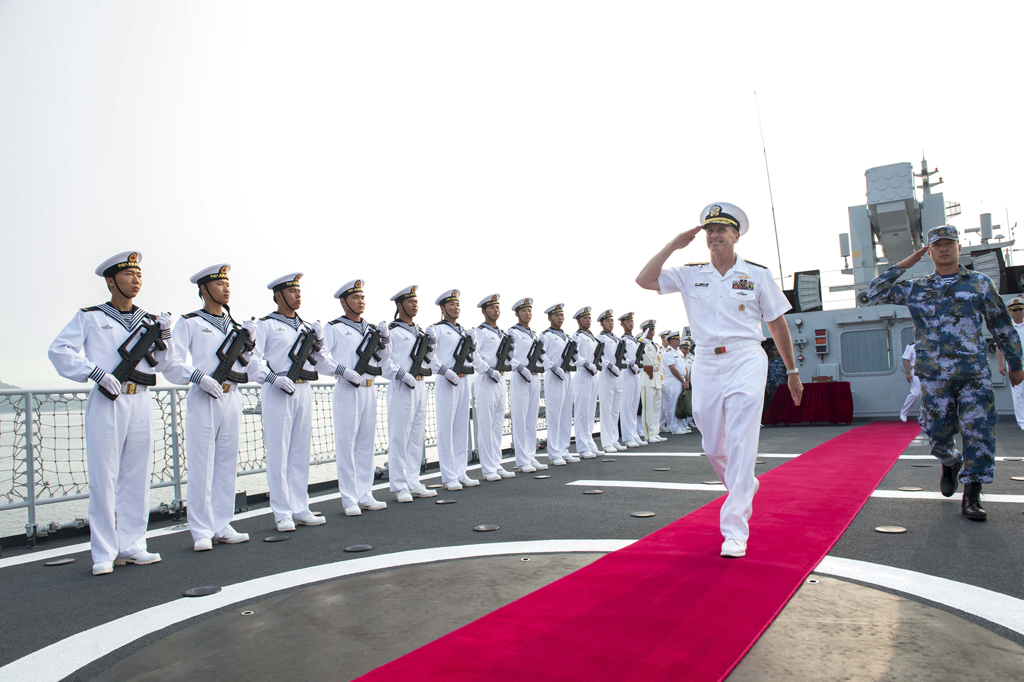
The United States and China, “are operating on two different playing fields” when it comes to transparency of their military activities and intentions in the Pacific, a former senior State Department official told a security forum at the Center for Strategic and International Studies (CSIS) think tank on Wednesday.
Richard Armitage — former U.S. deputy secretary of state — said thanks to the American media’s open reporting and face-to-face military interactions the Chinese have a clearer understanding of what the U.S. is doing than the U.S. has of China.
“We show them everything,” said Kurt Campbell — the chief executive office of the Asia Group and a former assistant secretary of state for East Asian and Pacific Affairs.
For the United States, it’s a case of “we’ll show you what we’ve got” to deter hostile actions.
Bonnie Glaser — an Asia expert at CSIS — said she expects the competition is going to continue between the United States and China in the near seas off its coast even though the two countries have taken some formal steps to avoid military confrontations.
In 2001 a Chinese military aircraft collided with a Navy reconnaissance P-3 Orion, and the United States plane has to land on Hainan Island. The P-3 was operating about 70 miles from the Chinese island province at the time of the collision. The American crew was detained and interrogated.
“It’s taken some time to put some meat on the bones” of these agreements that include rules of the road for military surface vessels, notification of military exercises and release of documents such as the Quadrennial Defense Review or Chinese white papers on security, she said.
Although China and Russia have an agreement to notify each other of ballistic missile testing, the United States and China do not.
“It’s harder to talk about air-to-air encounters and air-to-sea encounters” and reach an agreement on how to handle those, she said.
While most of the at-sea encounters do not involve combatants, “white hulls [Coast Guard and other nations’ coastal patrol vessels] are not covered” in any of these agreement at a time when these ships are becoming larger and better armed, Glaser said.
That puts into focus the, “two paradigms in conflict” in Pacific waters — keeping open sea lanes for shipments of goods, food and energy supplies and rising nationalist claims by China and other nations.
“China is now much more comfortable” in its role of being a major military power, seeing itself as “a co-equal of the United States” in Asian maritime affairs, Campbell said.
It also no longer backs off when surrounding nations coalesce against specific Chinese claims or actions.
“These steps are now fully coordinated” across the Chinese government, using the establishment of an Air Defense Identification Zone over the East China Sea as an example.
Chinese President Xi Jinping recognizes that encounters between combatants or coastal patrol vessels “can rapidly get out of hand” and that some of China’s recent actions have caused anxiety among its neighbors but this does not translate into stepping away from what China considers its interests.
Armitage said he did not expect a major change in Sino-Japanese relations — including a change in administrative control over disputed islands between Japan and China — even though Xi and Japan’s Prime Minister Shinzo Abe met at the Asian economic summit on Tuesday. He described the expressions of the two in a handshake picture as looking as if, “they were smelling each other’s socks.”
He added, “it’s not a heads of state meeting; it’s a heads of economies meeting” and Chinese leaders need to understand that what they have in that relationship is not “an Abe problem [but] it’s a Japan problem.”
Campbell said that it was important for the United States to stay engaged in Asia and the Pacific and participate in events such as the economic summit in China and the upcoming Association of South East Asia Nations meeting in Myanmar.
“This has to be like the diplomacy we do in Europe,” he said.
“We’ve got to actively make the commitment.”
The stakes remain high for the United States in the region, Armitage said.
“All our equities are in Asia,” he said.





